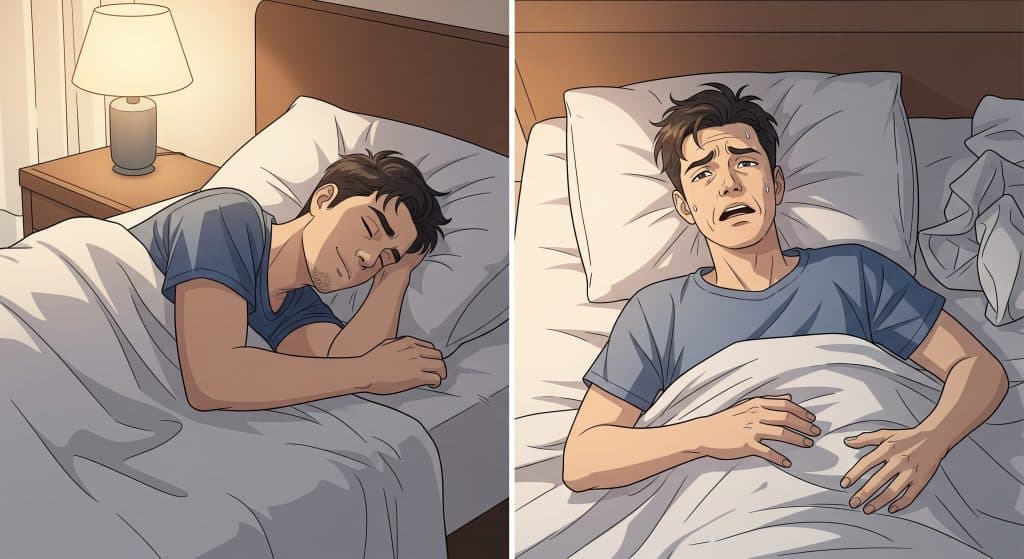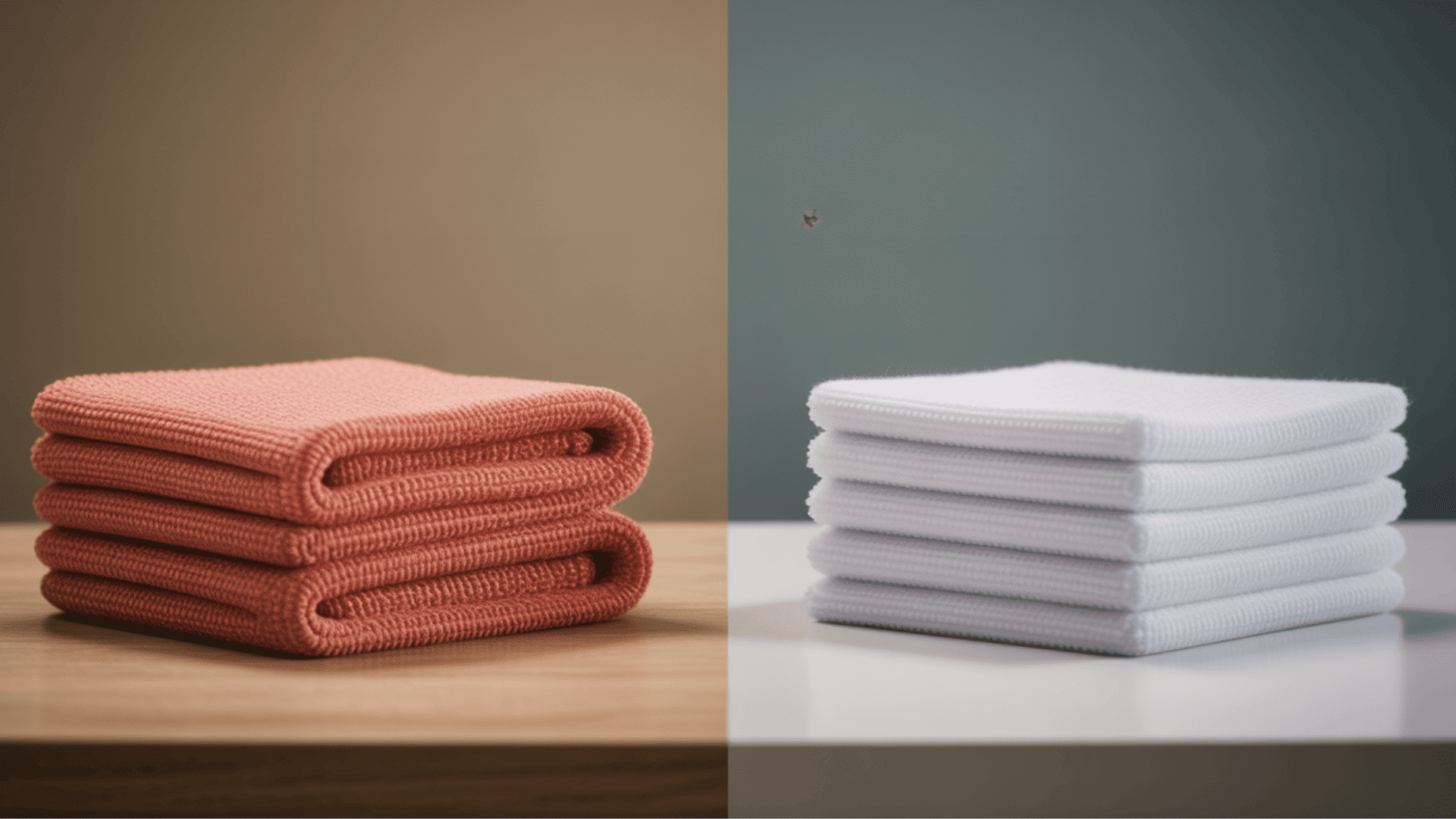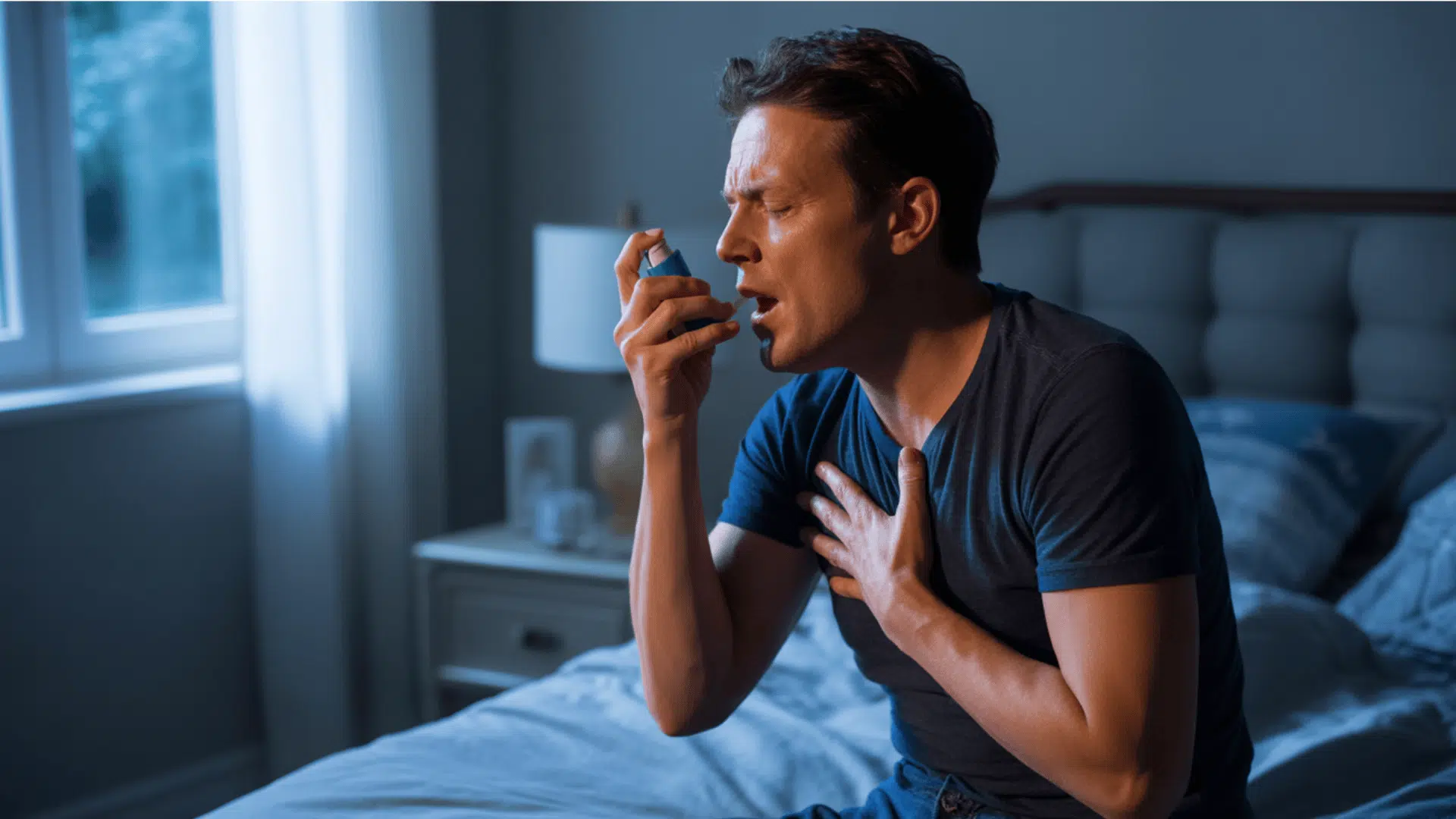Ever wonder if snoring or waking up gasping could be more than just an annoyance? I’ve seen how often people overlook the signs, even though it’s far more common and dangerous than they think.
The truth is that if untreated, sleep apnea can shorten life expectancy because the condition quietly damages your heart, brain, and other vital organs over time.
I’ll walk you through what sleep apnea is, how it affects your body, and why ignoring it can put your health at serious risk. You’ll also learn about the most effective treatments and lifestyle changes you can make to protect yourself.
What you’ve been dismissing as “just snoring” may actually be putting your life at risk. But first, let me explain what sleep apnea really is and why you should care about it.
What is Sleep Apnea?
Sleep apnea is a condition where you stop breathing while you’re sleeping. I know that sounds scary, but it happens to lots of people every night.
Your breathing doesn’t just get quiet; it actually stops for 10 seconds or more, then starts again. This can happen hundreds of times in one night, and you don’t even know it’s happening.
Think of it like your throat decides to take a break while you’re trying to sleep. You might sleep for 8 hours, but still wake up feeling terrible because your body was fighting to breathe all night long.
The Two Main Types
There are two ways your breathing can stop while you sleep, and it helps to know the difference.
- Obstructive Sleep Apnea (OSA). This is the one most people get. It happens when your throat muscles get too relaxed and block your airway. It’s like your own throat is choking you while you sleep.
- Central Sleep Apnea (CSA). This one is not as common, but it’s more serious. Your brain forgets to tell your body to breathe. It’s not that something is blocking your throat – your brain just stops telling your lungs to work.
Most people who have sleep apnea have the first type, but both can hurt your health.
Untreated Sleep Apnea Affects Life Expectancy
Let me share some numbers that might scare you, but remember, there’s good news at the end.
1. The Research Shows Scary Numbers
Here’s what doctors found when they studied thousands of people with sleep apnea over many years.
People with severe sleep apnea have three times the risk of dying compared to people without sleep apnea.
But here’s where it gets even scarier: when people with severe sleep apnea don’t get treatment, their risk of dying goes up to over four times.
Another big study by Harvard Health Publishing looked at almost 400 people for 14 years. They found that people with moderate-to-severe sleep apnea had over six times the risk of dying from any cause compared to people without sleep apnea.
2. What Does This Mean in Real Life?
These big numbers might be confusing, so let me break down what they actually mean for your everyday life.
Research shows that untreated sleep apnea can shorten a person’s life by several years. The American Academy of Sleep Medicine says untreated sleep apnea increases your risk of death by 17%.
Think about it this way: if you’re 40 years old and would normally live to 80, untreated sleep apnea could mean you might only live to your mid-70s instead.
That’s potentially years you could miss with your kids, grandkids, or doing things you love.
3. Why Your Life Gets Shorter
Let me explain exactly how sleep apnea damages your body and why it can kill you.
The main reason untreated sleep apnea shortens your life is that it hurts your heart. About 42% of deaths in people with severe sleep apnea were from heart disease or stroke, compared to only 26% in people without sleep apnea.
Every time you stop breathing, your heart has to work harder, and your blood pressure shoots up. This happens hundreds of times per night, putting massive stress on your heart.
Over time, this constant stress leads to heart problems, high blood pressure, and strokes.
4. The Really Good News
Here’s what should make you feel hopeful about your future with proper treatment.
Treating sleep apnea reduces your risk of dying early by 3 times, cuts your stroke risk in half, and makes you five times less likely to have a heart attack compared to people who don’t get treatment.
When people used CPAP treatment regularly, their risk of dying from heart problems dropped from very high to much safer levels.
In fact, people with severe sleep apnea who used CPAP had death rates similar to people who didn’t have sleep apnea at all. This means treatment can literally save your life.
Untreated sleep apnea can take years off your life, mainly by damaging your heart and blood vessels. The key is getting diagnosed and finding a treatment that works for you.
How Sleep Apnea Affects the Body
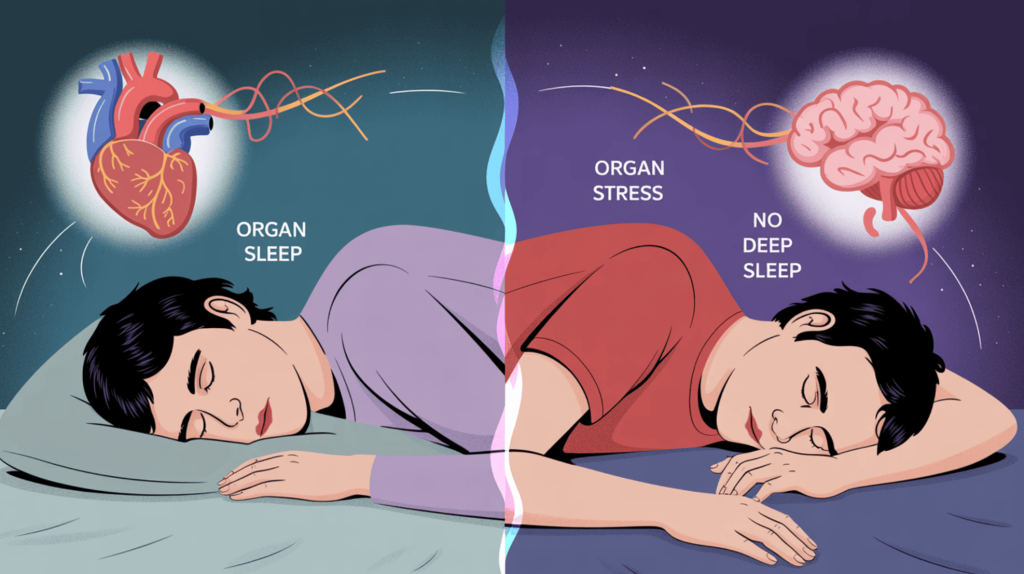
Here’s the scary part – let me show you what happens to your body when this keeps happening night after night.
- Your Body Goes Into Panic Mode: Every time you stop breathing, your body freaks out. Your heart beats faster, your blood pressure goes up, and stress chemicals flood your body.
- Your Oxygen Drops: When you stop breathing, the oxygen in your blood drops really fast. Your brain and other body parts aren’t getting what they need to work right.
- You Never Really Rest: You never get the deep sleep your body needs to fix itself. At the same time, your heart, brain, and other organs are stressed out from not getting enough oxygen and waking up all the time.
Sleep apnea isn’t just about snoring or being tired; it’s actually hurting your whole body every night.
Major Health Risks of Untreated Sleep Apnea
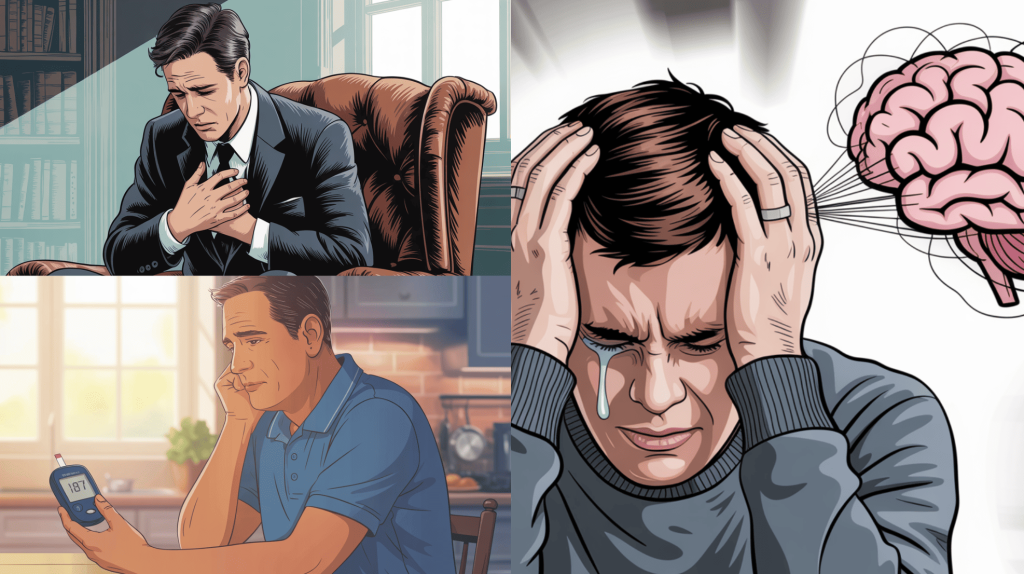
Sleep apnea doesn’t just make you tired; it can seriously damage your body if you don’t treat it. Here are some most common risks associated with it:
| Health Area | Specific Risks | How Sleep Apnea Causes It |
|---|---|---|
| Heart Problems | High blood pressure, stroke, heart attack | Every time you stop breathing, your heart goes crazy trying to get oxygen to your body. |
| Diabetes | Blood sugar gets too high | When you don’t sleep well, your body stops using insulin properly. |
| Brain Problems | Depression, a higher chance of dementia | Your brain needs good sleep to work right. Over time, not getting enough oxygen can hurt your brain cells. |
| Other Body Parts | The liver gets fatty, kidneys don’t work | Sleep apnea stresses out your whole body. Your liver starts storing too much fat, and your kidneys can’t clean your blood. |
Sleep apnea is like a slow poison that damages every part of your body, but the good news is that treating it can stop this damage and even help your body heal.
Can Untreated Sleep Apnea Be Fatal?
Yes, untreated sleep apnea can absolutely be fatal, and it’s important to understand just how serious this condition really is.
Sudden Death Risks
The scariest thing about sleep apnea is that it can lead to sudden death during sleep, without warning. When you stop breathing repeatedly at night, your oxygen drops, and your heart works extra hard to keep going.
This is especially dangerous for people over 60 with severe apnea. Over time, this strain can cause your heart to fail while you’re sleeping, when your body is weakest.
The repeated drops in oxygen put constant stress on the heart. It’s like forcing your heart to run a marathon every single night without a break. Eventually, it can give out under the pressure, and you may not wake up.
Life Expectancy Impact
Doctors have tracked thousands of people over 10 to 20 years, and the pattern is clear: untreated sleep apnea shortens lives. These weren’t hospital patients; they were everyday people.
Others showed that severe apnea can cut your life by several years. The biggest risk comes from long-term heart damage caused by poor oxygen levels every night, which builds up slowly but steadily until it leads to deadly complications.
That means treatment works. It can literally save your life and restore your normal life expectancy. The sooner you treat it, the better your chances of staying healthy for years to come.
Can Treatment Reverse the Risks?
CPAP and Other Therapies
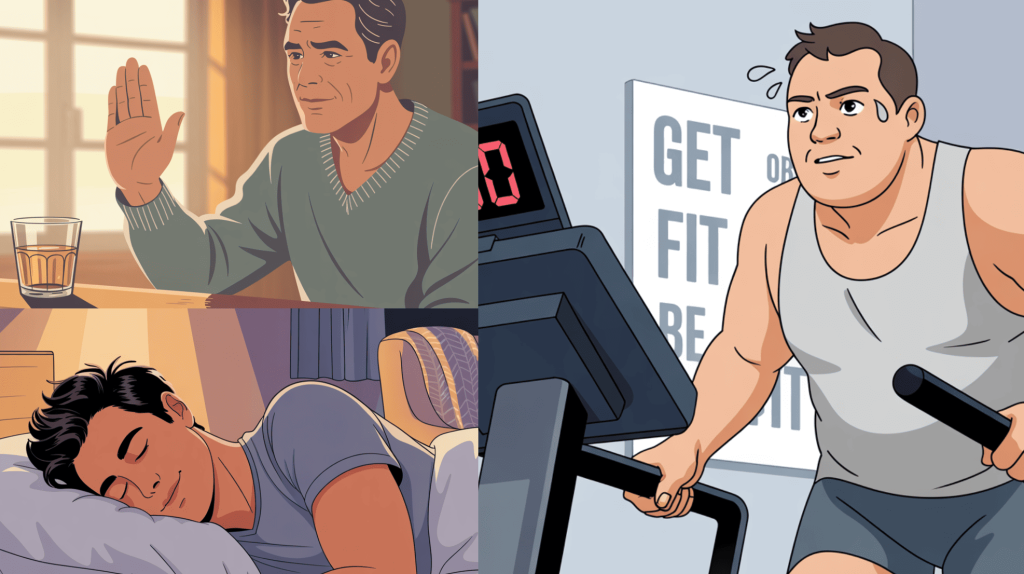
There are several ways to treat sleep apnea, and they all work really well when you stick with them.
| Treatment Type | What It Does | Benefits |
|---|---|---|
| CPAP (Continuous Positive Airway Pressure) | Gently pushes air into your airway to keep it open while you sleep. | Same death risk as people without sleep apnea- 5x lower risk of heart attack |
| Weight Loss | Reduces fat around the neck and airway, easing breathing during sleep. | Can significantly reduce or eliminate sleep apnea symptoms |
| Side Sleeping | Keeps the airway more open. | A simple change that improves airflow |
| Avoiding Alcohol | Prevents throat muscles from relaxing too much at bedtime. | Less airway collapse during sleep |
While these methods may not replace CPAP for everyone, they can be powerful tools in reducing symptoms and improving sleep.
Reclaiming Life Expectancy
Once you start treating your sleep apnea, your body begins healing almost right away. Within weeks, your blood pressure may drop, your sleep becomes deeper, and you feel more alert during the day.
Your heart gets a break, your brain sharpens, and your mood lifts. Over time, the benefits grow even stronger. Treating sleep apnea lowers your risk of diabetes, heart disease, stroke, and even dementia.
It helps your liver and kidneys work better and adds healthy years to your life. These improvements aren’t just about sleep; they’re about restoring your overall health.
With consistent treatment, you can protect your body, feel more like yourself again, and live longer. And the best part? It’s never too late to start.
Conclusion
Don’t let sleep apnea steal your years. It can take years off your life and raise your risk of dying early. But here’s the good news: treatment works. Every health issue I’ve talked about can improve once you start getting help.
Treating sleep apnea isn’t just about better sleep; it’s about living longer and feeling better, because untreated sleep apnea significantly shortens life expectancy. The damage happens silently, night after night.
The sooner you act, the more your body can heal. If you think you might have sleep apnea, talk to your doctor.
Want to learn more ways to protect your health and improve your sleep? Read my other blogs for simple, effective tips you can start today.


